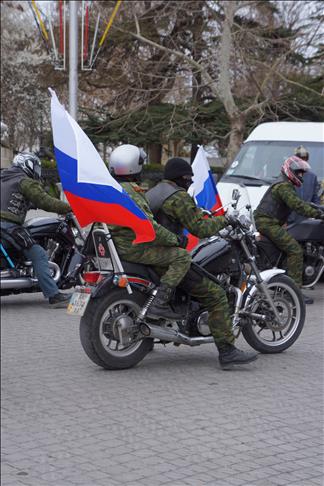
Contrary to Russian claims, the legal grounds for self-determination in Crimea are very different from those of the Kosovo declaration independence of 2008 as claimed by Russia, academics say.
In order to justify the holding of the referendum on Sunday, which resulted in an overwhelming approval for annexation to Russia, Moscow has argued that the Kosovo precedent is no different from Crimea's right to self-determination.
"Russia has no ‘invasion’ plans in Ukraine and if Kosovo was a special case, then Crimea is also," the Russian Foreign Minister, Sergey Lavrov, said Friday.
Following brutal repression by the Yugoslav army of ethnic Albanians in Kosovo led to a NATO bombing campaign in 1999, the Kosovars voted to break away from Serbia in 2008, infuriating Russia as it frowned upon what it considered meddling by the United States in its sphere of influence. The United states, and most of the international community justified the 1999 intervention and support for the 2008 Kosovar independence by citing concerns over a humanitarian crisis.
Russia has since used similar language, arguing for the defense of persecuted Russian-speaking people, first when intervening in Georgia in 2008 -- leading to the independence of South Ossetia and Abkhazia, truly a de facto annexation -- and now in Ukraine with Crimea.
It is precisely the lack of a humanitarian crisis that separates the Kosovar and Crimean cases, finds Neil Melvin, an expert in international conflicts and peace studies at Stockholm International Peace Institute.
"There was extensive and systematic discrimination and violation of human rights in Kosovo, explains Melvin. This created the main legal basis for an international intervention and the declaration of independence. However, with Crimea, there really is no humanitarian crisis despite the claims advanced by Russia."
Recognition as a political outcome should also be taken into consideration said Melvin: "The Kosovar decision in 2008 brought international recogniton. The UN, NATO and other international organizations contributed to the Kosovar secession, while in the Crimean case there is only unilateral action pursued by Russia."
"The lack of any discriminative action by the Ukrainian state against Crimeans as well as the presence of active Russian troops in Crimea take away any legal basis for the referendum," agreed Robert McCorquodale, the Director of the British Institute of International and Comparative Law, speaking at a panel held at the British Institute last Friday.
“The right of self-determination does not in itself give a legal right for a state to intervene in the territory of another state, whether directly or through private actors even if there is oppression." said McCorquodale.
A position defended by U.S. Secretary of State John Kerry speaking at the Foreign Relations Committee of U.S Congress on Sunday and stating that the referendum cannot be compared to the Kosovar case because of the presence of Russian troops in Crimea.
“You can’t consider an election, in the presence of troops and hastily put together in a few weeks without any debate -- and also contrary to international law and contrary to the constitution of Ukraine -- as a free and fair election,” Kerry said.
The right of self-determination denotes the legal right of people to decide their own destiny in the international order and is protected in the United Nations Charter.
englishnews@aa.com.tr


